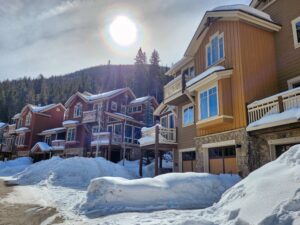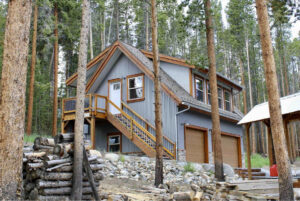As tourism-dependent Colorado communities face headwinds from economic uncertainty and federal trade policies, they also face a choice: Whether to ask voters to raise lodging taxes to fund a wider range of government services.
Gov. Jared Polis in May signed into law House Bill 1247, which increases from the current level of 2% up to 6% the size of lodging taxes that counties can seek to impose in unincorporated areas on hotels, short-term rentals and other temporary abodes. Sponsors of the bill included a safety clause that enacted the bill immediately, in large part because that gave local-government leaders the ability to put tax-hike questions onto the November ballot if they want.
Despite the bill having overwhelming support from county leaders saying they needed more tax revenue quickly to fund everything from roads to firefighting services, there’s been only minimal consideration of potential November ballot questions so far. Archuleta County commissioners discussed the idea during a work session last month, according to the Pagosa Springs Sun, but many other counties have yet to broach the subject.
What appears to be a slowing of tourist traffic may be influencing that decision. Resorts across the Western U.S. have reported a drop in bookings, the Summit Daily wrote, as residents of countries like Canada seek to avoid America due to newly disadvantageous trade policies, and economic uncertainty around tariffs is reducing discretionary spending.
A potential tripling of lodging taxes
Officials in the hotel, recreation and short-term rental industries, meanwhile, are watching closely to see which counties will be the guinea pigs to find out if residents will support raising taxes on the tourists who are the lifeblood of their communities. Some have said they would like to be able to back such tax hikes to boost government services, while many others warn that doing anything to increase the cost of coming to an area could push potential visitors to take their money elsewhere.

Homes in a resort area of Summit County
“This bill is asking you to let counties more than double the lodging-tax rate. That is a very significant jump,” Piep van Heuven, director of government affairs for Colorado Ski Country USA, told the Senate Local Government and Housing Committee in March. “Fundamentally, this lets counties tax the tourism sector to fund services.”
Current law allows counties to impose lodging taxes of as much as 2%. Thirty-five counties have some sort of lodging tax, and 31 of those go up to the maximum amount. Collections vary wildly, from about $5,000 a year in rural Bent County to $3.8 million in Summit County, according to a fiscal note from the Colorado Legislative Council.
HB 1247, sponsored by Democratic Reps. Katie Stewart of Durango and Karen McCormick of Longmont, allows counties to ask voters for lodging-tax rates as high as 6% and expands the services these taxes can fund. While revenues now can go only to tourism marketing and to housing and childcare for the tourism sector, the bill permits them to be used on infrastructure like roads and water systems and on public safety such as law enforcement, firefighting and emergency medical services.
Why backers say the revenue boost is warranted
The need is twofold, sponsors and supporters told legislators. Reductions in the rates of property taxes that largely fund county governments have led to lower-than-hoped-for growth in revenues and are forcing officials to seek new money for some key services. And tourists, they argue, contribute disproportionately to road degradation, sheriff’s office calls and other services that the increased larging tax could help to fund.
Gilpin County Commissioner Jeff Aiken noted to the Senate committee that most of the people who end up in his county’s jails are arrested in or around casinos in Black Hawk — yet the county doesn’t get financial help for the facilities from the city. Its current 2% lodging tax helps finance childcare and even fund the county fair, but raising it and using it to help law-enforcement needs that are exacerbated by visitors would offset significant costs, he said.

Colorado state Sen. Dylan Roberts speaks on the Senate floor during the 2025 legislative session.
“Local lodging taxes … are an important tool for our local governments to address needs that come from tourism,” said Sen. Dylan Roberts, the Frisco Democrat who sponsored HB 1247 in his chamber with Republican Senate Minority Leader Cleave Simpson of Alamosa. “This is not a silver bullet for these problems. But it has a proven track record of success at 2% and can do even more at 5%.”
When HB 1247 got back to the House later, members amended the bill to raise the cap further to 6%. The cap applies only to lodging in unincorporated areas of counties, as cities do not have a cap on the lodging tax that their residents can approve, though an amendment ensures all residents of the county can vote on the measure.
Opposition from ski-resort, short-term rental operators
But with Republicans concerned about the potential for increasing taxes, the proposal became a largely partisan issue, even if it didn’t attract the same level of fierce opposition as other efforts this session. It passed the House along purely partly lines, and Simpson was one of only three members of his party to back it in the Senate.
Some officials who are in the business of trying to attract visitors wonder when these county taxes, piled on top of state taxes and other fees, will be enough to make Colorado a less attractive place to visit. And they worry that if HB 1247 isn’t the straw that breaks the camel’s back, then it certainly pushes closer to the edge of elasticity for visitor spending.
Van Heuven, for example, noted that if counties take advantage of the new law, some visitors to ski areas could see taxes on their lodging bills ranging anywhere from 12% to 21%, even as they already contribute a disproportionate amount to local tax revenues. Jim Clancy, executive director of the Beaver Creek Resort Co., said even if increased lodging taxes don’t deter visitors from booking a place, they could cause them to cut back on spending on restaurants or shops, causing negative impacts on an area’s economy.

Richard Mason built this short-term rental property outside of Breckenridge by hand. He is worries that rising lodging taxes could begin scaring away potential visitors.
Richard Mason, who owns a short-term rental outside of Breckenridge that he built himself, questions whether counties truly need the extra revenue, noting that La Plata County’s revenue has doubled since 2013, and Summit County’s has tripled. He told a House committee in March that this is the seventh bill in the past six years that affects the revenue-generating ability of short-term rental owners — some of which have passed and some of which have died — and said that the costs could push out visitors.
Some hotel officials support lodging-tax hikes
“Between ever increasing fees and taxes … couples and families are increasingly finding themselves squeezed out of the Colorado vacation experience,” Mason said. “I don’t know if all guests are studying taxes that much, but I do. And Colorado is just pricing themselves out of competitiveness.”
Not everyone in the lodging industry is worried. Magda King, general manager of the Antlers at Vail, said that at the price point that visitors to her town pay, a 4% increase in taxes won’t impact decisions on where to stay, and it could boost services like law enforcement that could make the destination more attractive. But she also acknowledged that smaller areas with lower average room rates could have more trouble absorbing the impact.
Affected business owners are now in a wait-and-see mode to see whether counties will jump at the opportunity to seek voter approval of new revenue or whether other economic factors could get in the way. But it’s likely that they will study the decisions of these local governments — and their voters — to see whether increased lodging taxes can be a boon or a burden for area economies.
